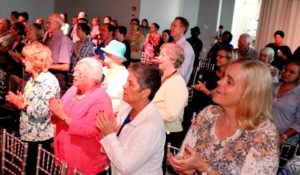“We’re here to disrupt aging,” said Dr. Bill Thomas, an author, entrepreneur, musician, teacher, farmer and physician whose wide-ranging work explores the terrain of human aging. Perhaps best known as the founder of The Eden Alternative and the creator of The Greenhouse Project, which Provider Magazine has called the “pinnacle of culture change,” Dr. Thomas has been disrupting aging for decades. And now he is bringing his message across the country through interactive workshops and ‘non-fiction theatre experiences.’
“Let’s open a new space,” he continued, “not to negate that suffering exists within the face of dementia. But the fact is that even within that we can create space for connection.”
The workshop used direct quotes from seniors with dementia which were sometimes uncomfortable to hear, but always enlightening, and interspersed those quotes with music, stories and observations to connect the audience in the experience.
Here are some lessons learned:
- Connect through music: Music is a universal language that can connect older people to young folks and everyone in-between. It is a language that does not require words. The ground-breaking film Alive Inside showed how music can ‘wake up’ people with dementia. It touches a part of their brain and can elicit feelings, activity and even words that many had thought lost to the person with dementia.
- Beware of ‘artificial purpose’: Jennifer Carson, a pioneer in the world of partnership research, shared a story from her 30-year career in long-term care: “I had gotten an old wooden boat for the dementia community where I worked. I thought that scraping and painting it would be a great activity. I thought it would give people a sense of purpose.” Instead, she learned that the group just wanted to know when they were finally going to be done having to scrape and paint the boat. It was artificial – not real purpose. The people she served wanted activities that were meaningful to them, not just any old activity.
- Listen more: The direct quotes from many different older people resonated with the group. The messages were clear – we need to HEAR them. Here’s a sampling of those quotes:
- ‘People don’t look at me as the same person anymore. They see a big red ‘A’ for Alzheimer’s on my forehead.’
- ‘I don’t know you here (mind), but I know you here (heart).’
- ‘Get rid of meaningless activities. We need to be creative together – identify what is interesting to me.’
- ‘I can grow, I can learn, I can contribute.’
- ‘My name is not homeless; my mother calls me Baby.’
- ‘People are afraid to spend time with me – they don’t come just to be with me.’
- ‘We’re fairly normal . . . whatever normal is.’
- ‘Having Alzheimer’s is an adventure, not an illness.’
- ‘I’m still here.’
- Ask ourselves ‘what are we doing today that should be open to disruption?’: Be sure to discuss, probe, challenge and explore answers to this.
- Take the time to understand each individual: Carson stressed that dreams don’t die even in the face of death, urging people to take the time to get to know the individuals they serve, learn about who they are and what is important to them.
Dr. Carson noted that it doesn’t necessarily take expensive gadgets, equipment, or funding to disrupt aging. “We have these super powers already within each of us,” she reminded the audience. We can support engagement, meaningfulness and true purpose. We can open space for more play and pride to exist. All we need to do is to engage the person in front of us. To see him or her. To truly see.


